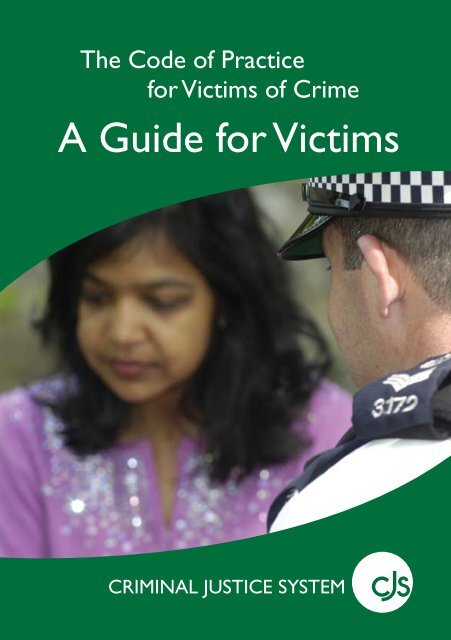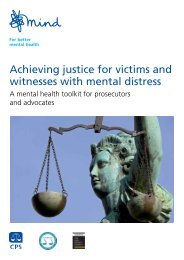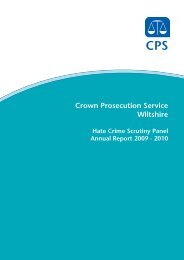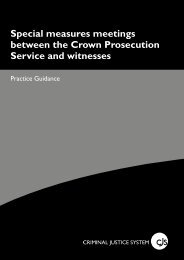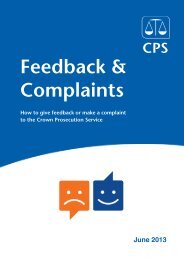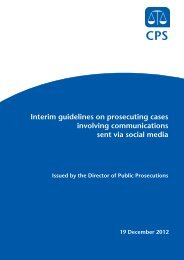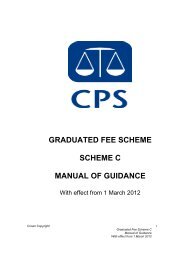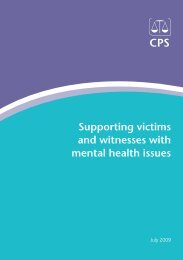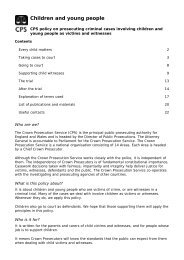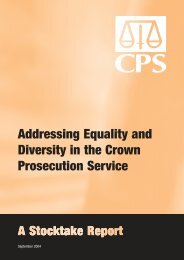Code of Practice for Victims of Crime
Code of Practice for Victims of Crime
Code of Practice for Victims of Crime
You also want an ePaper? Increase the reach of your titles
YUMPU automatically turns print PDFs into web optimized ePapers that Google loves.
The <strong>Code</strong> <strong>of</strong> <strong>Practice</strong><br />
<strong>for</strong> <strong>Victims</strong> <strong>of</strong> <strong>Crime</strong><br />
<br />
A Guide <strong>for</strong> <strong>Victims</strong>
The <strong>Code</strong> <strong>of</strong> <strong>Practice</strong> <strong>for</strong> <strong>Victims</strong> <strong>of</strong> <strong>Crime</strong> | A Guide <strong>for</strong> <strong>Victims</strong><br />
The <strong>Code</strong> <strong>of</strong> <strong>Practice</strong> <strong>for</strong> <strong>Victims</strong> <strong>of</strong> <strong>Crime</strong> | A Guide <strong>for</strong> <strong>Victims</strong><br />
1<br />
This guide sets out your rights under the <strong>Code</strong> <strong>of</strong> <strong>Practice</strong><br />
<strong>for</strong> <strong>Victims</strong> <strong>of</strong> <strong>Crime</strong><br />
It tells you what you can expect from each <strong>of</strong> the criminal justice<br />
agencies after becoming a victim <strong>of</strong> crime.<br />
If you don’t think that you have had the support, in<strong>for</strong>mation and<br />
advice set out in this guide, you can make a complaint. Details <strong>of</strong><br />
how to complain are contained at the back <strong>of</strong> this leaflet.<br />
If you do not want to receive the services set out in this guide,<br />
you can opt out by telling the police <strong>of</strong>ficer you have had contact with,<br />
or the person dealing with your case at that time (if you decide to opt<br />
out later on in the criminal justice process). Remember that you can<br />
then opt back in at any stage.<br />
Vulnerable and intimidated victims<br />
Some victims are able to receive an enhanced<br />
service under the <strong>Code</strong>.<br />
Vulnerable victims are all victims under 17 years old or whose quality<br />
<strong>of</strong> evidence is likely to be reduced because they have a mental disorder<br />
or learning disability or a physical disability or disorder.<br />
Intimidated victims are victims whose quality <strong>of</strong> evidence is likely to be<br />
reduced because they are in fear or distress about giving evidence.<br />
If you have been a victim <strong>of</strong> domestic violence or sexual assault<br />
or have lost a family member through murder or manslaughter,<br />
you will also be defined as a vulnerable victim.<br />
You will be told if you are identified as vulnerable or intimidated as it<br />
depends on your personal circumstances and the details <strong>of</strong> your case.<br />
The next few pages set out what you can expect from each agency.<br />
The chart in the centre <strong>of</strong> this leaflet explains what each agency does.<br />
The police will:<br />
• tell you if there is not going to be an investigation into the crime,<br />
within five days <strong>of</strong> you reporting the crime<br />
• give you a copy <strong>of</strong>, or make sure you have access to,<br />
the local ‘<strong>Victims</strong> <strong>of</strong> crime’ leaflet<br />
• refer your details to the voluntary organisation Victim Support,<br />
unless you ask them not to (this will not apply <strong>for</strong> a small number<br />
<strong>of</strong> victims)<br />
• keep you updated on a monthly basis until the case<br />
is closed<br />
• tell you if there is a possibility that the case may be reviewed at<br />
a later date and ask you if you want to be in<strong>for</strong>med <strong>of</strong> any reviews<br />
• assign you a Family Liaison Officer if you have lost a family member<br />
through murder or manslaughter, and provide you with a support<br />
pack<br />
• tell you if someone is arrested within one day if you are receiving<br />
the enhanced service or within five days <strong>for</strong> other victims<br />
• tell you if they release a suspect with no further action being taken,<br />
within one day if you are receiving the enhanced service or<br />
within five days <strong>for</strong> other victims<br />
• tell you when they release a suspect on bail and let you know if<br />
there are any bail conditions and when those conditions are altered,<br />
within one day if you are receiving the enhanced service or<br />
within five days <strong>for</strong> other victims<br />
• tell you about a decision they take to charge or<br />
not charge a suspect within one day if you are<br />
receiving the enhanced service or within five<br />
days <strong>for</strong> other victims
2 The <strong>Code</strong> <strong>of</strong> <strong>Practice</strong> <strong>for</strong> <strong>Victims</strong> <strong>of</strong> <strong>Crime</strong> | A Guide <strong>for</strong> <strong>Victims</strong><br />
The <strong>Code</strong> <strong>of</strong> <strong>Practice</strong> <strong>for</strong> <strong>Victims</strong> <strong>of</strong> <strong>Crime</strong> | A Guide <strong>for</strong> <strong>Victims</strong><br />
3<br />
• tell you if the person is given a caution, reprimand, final warning or<br />
penalty notice <strong>for</strong> disorder within one day if you are receiving<br />
the enhanced service or within five days <strong>for</strong> other victims.<br />
The Witness Care Unit will:<br />
• tell you if you will be required to give evidence<br />
• tell you the dates <strong>of</strong> the court hearings<br />
• give you a copy <strong>of</strong> the ‘Witness in court’ leaflet or other<br />
relevant leaflet, if you are required to give evidence<br />
• tell you about court results, <strong>for</strong> example if the<br />
defendant was found guilty, within one day <strong>of</strong><br />
receiving the outcome from the court, and explain<br />
any sentence given<br />
• tell you if the <strong>of</strong>fender appeals against their conviction or sentence<br />
and tell you the outcome <strong>of</strong> any appeals.<br />
The Crown Prosecution Service will:<br />
• tell you if they decide not to charge someone in relation to your<br />
case within one day if you are receiving the enhanced<br />
service or within five days <strong>for</strong> other victims<br />
• tell you if they decide to drop or alter the charges<br />
after someone has been charged within one day<br />
if you are receiving the enhanced service or<br />
within five days <strong>for</strong> other victims<br />
• pay your expenses within ten days <strong>of</strong> receiving your expenses<br />
claim <strong>for</strong>m<br />
• answer any detailed questions you have about the sentence given.<br />
Her Majesty’s Courts Service staff will:<br />
• pass in<strong>for</strong>mation about court dates and case outcomes to the<br />
Witness Care Unit and the police so that they can keep you updated<br />
• make sure you have a separate waiting area and seat<br />
in the courtroom away from the defendant’s family,<br />
where possible<br />
• try to ensure that you do not have to wait more than two hours<br />
to give evidence<br />
• provide an in<strong>for</strong>mation point at the court, where possible,<br />
so you can find out what is happening in the case.<br />
The Youth Offending Team will:<br />
• contact you to explain their role and ask you<br />
if you want to be involved in a restorative justice<br />
intervention, if appropriate<br />
• keep you in<strong>for</strong>med about the progress <strong>of</strong> the case if you decide<br />
to be involved<br />
• give you in<strong>for</strong>mation about appropriate support services if you<br />
want it.<br />
• <strong>of</strong>fer to meet with you to discuss their decisions if your case<br />
involves a death caused by criminal conduct, child abuse, sexual<br />
<strong>of</strong>fences, racially and religiously aggravated <strong>of</strong>fences or <strong>of</strong>fences<br />
with a homophobic or transphobic element<br />
• ensure that someone from the Crown Prosecution Service is<br />
introduced to you at court and answers your questions
4 The <strong>Code</strong> <strong>of</strong> <strong>Practice</strong> <strong>for</strong> <strong>Victims</strong> <strong>of</strong> <strong>Crime</strong> | A Guide <strong>for</strong> <strong>Victims</strong><br />
The <strong>Code</strong> <strong>of</strong> <strong>Practice</strong> <strong>for</strong> <strong>Victims</strong> <strong>of</strong> <strong>Crime</strong> | A Guide <strong>for</strong> <strong>Victims</strong><br />
5<br />
The National Offender Management Service<br />
(Probation) will:<br />
• contact you if the <strong>of</strong>fender in your case was sentenced<br />
to 12 months or more <strong>for</strong> a sexual or violent <strong>of</strong>fence,<br />
including mentally disordered <strong>of</strong>fenders in certain<br />
circumstances<br />
• give you general in<strong>for</strong>mation at key stages in the <strong>of</strong>fender’s sentence,<br />
such as transfer to a different category <strong>of</strong> prison or applications <strong>for</strong><br />
release. They will be unable to give you detailed in<strong>for</strong>mation about<br />
<strong>of</strong>fenders, <strong>for</strong> example which prison the <strong>of</strong>fender is in, the exact<br />
date <strong>of</strong> release or exact location on release<br />
• give you the opportunity to express your views and any concerns<br />
about what licence conditions or supervision requirements the<br />
<strong>of</strong>fender should be subject to on their release from prison<br />
• tell you what licence conditions or supervision requirements<br />
the <strong>of</strong>fender will be subject to if they relate to contact with you<br />
or your family.<br />
The National Offender Management<br />
Service (Prisons) will:<br />
• provide a telephone helpline which you can ring if you receive<br />
unwanted contact from the <strong>of</strong>fender or if you have any concerns<br />
about the <strong>of</strong>fender’s release.<br />
The Parole Board will:<br />
• take into account any in<strong>for</strong>mation that relates directly to the current<br />
risk to you by the <strong>of</strong>fender when deciding whether or not to grant<br />
or recommend release and will reflect this in the parole decision<br />
• consider any requests you make to attach conditions to the<br />
<strong>of</strong>fender’s licence on release<br />
• provide an explanation where a licence condition that you have<br />
requested has been amended or has not been included<br />
• consider any request by you to vary or amend the licence conditions<br />
at a later date.<br />
The Criminal Injuries Compensation Authority will:<br />
• reply to all correspondence about applications within 20 days<br />
<strong>of</strong> receiving it<br />
• explain any decisions to refuse or reduce compensation that<br />
you have claimed<br />
• update you on the progress <strong>of</strong> your application if you haven’t<br />
had a decision within 12 months <strong>of</strong> making your application<br />
• tell you that you have a right <strong>for</strong> their decision to be reviewed<br />
and how you apply <strong>for</strong> a review<br />
• explain the outcome <strong>of</strong> the review to you and tell you how<br />
to appeal to the Criminal Injuries Compensation Appeals Panel.<br />
The Criminal Injuries Compensation Appeals<br />
Panel will:<br />
• give you up-to-date in<strong>for</strong>mation about the appeals process<br />
• respond to any correspondence relating to appeal cases within<br />
20 days <strong>of</strong> receiving it<br />
• explain the appeal decision to you.<br />
The Criminal Cases Review Commission will:<br />
• decide whether to contact you if they are reviewing a conviction<br />
or sentence in a case you are connected to when it’s likely that<br />
you’ll hear about what’s going on<br />
• tell you their decision and if they are referring the case to the<br />
Court <strong>of</strong> Appeal or Crown Court.
6 The <strong>Code</strong> <strong>of</strong> <strong>Practice</strong> <strong>for</strong> <strong>Victims</strong> <strong>of</strong> <strong>Crime</strong> | A Guide <strong>for</strong> <strong>Victims</strong> The <strong>Code</strong> <strong>of</strong> <strong>Practice</strong> <strong>for</strong> <strong>Victims</strong> <strong>of</strong> <strong>Crime</strong> | A Guide <strong>for</strong> <strong>Victims</strong><br />
7<br />
How to complain<br />
Agency<br />
Police<br />
Crown Prosecution<br />
Service (CPS)<br />
Joint Police/Crown<br />
Prosecution Service<br />
Witness Care Units<br />
How to complain<br />
Ask at your local police station <strong>for</strong><br />
a leaflet explaining how to make a<br />
complaint. You will receive a response<br />
within 10 working days<br />
Write to the CPS <strong>of</strong>fice that dealt with<br />
your case, outlining your complaint.<br />
Contact details <strong>for</strong> CPS <strong>of</strong>fices can<br />
be found at police stations, Citizens<br />
Advice Bureaux or in the Yellow Pages.<br />
The CPS <strong>of</strong>fice will aim to reply within<br />
three working days.<br />
Write to the Witness Care Unit that<br />
dealt with your case, setting out your<br />
complaint.<br />
National Offender<br />
Management Service<br />
(Prisons)<br />
Parole Board<br />
Criminal Injuries<br />
Compensation<br />
Authority<br />
Complaints should be addressed<br />
to: Director General’s Briefing and<br />
Casework Unit, HM Prison Service,<br />
Cleland House, Page Street, London<br />
SW1 4LN.<br />
You should complain in writing to:<br />
The Complaints Officer, Parole Board<br />
<strong>for</strong> England and Wales, Grenadier<br />
House, 99–105 Horseferry Road,<br />
London SW1P 2DD.<br />
You should make your complaint in<br />
writing to: The Manager, Customer Care<br />
Team, Criminal Injuries Compensation<br />
Authority, Tay House, 300 Bath Street,<br />
Glasgow G2 4LN. You will receive a<br />
reply within 20 working days.<br />
Crown Court<br />
Magistrates’ Court<br />
Youth Offending<br />
Team<br />
Complaints should be made in<br />
writing to the Complaints Officer<br />
at the court. A reply will be sent<br />
within five working days.<br />
Complaints should be made in writing<br />
to the Complaints Officer at the court.<br />
A reply will be sent within five working<br />
days.<br />
You should write to the Youth<br />
Offending Team Manager at your<br />
local Youth Offending Team,<br />
explaining your complaint.<br />
Criminal Injuries<br />
Compensation<br />
Appeals Panel<br />
Criminal Cases<br />
Review Commission<br />
You should make your complaint<br />
within three months <strong>of</strong> the hearing by<br />
writing to: Customer Service Manager,<br />
Criminal Injuries Compensation Appeals<br />
Panel, 11th Floor, Cardinal Tower, 12<br />
Farringdon Road, London EC1M 3HS.<br />
You should write to: The Complaints<br />
Manager, Criminal Cases Review<br />
Commission, Alpha Tower, Suffolk Street,<br />
Queensway, Birmingham B1 1TT.<br />
National Offender<br />
Management Service<br />
(Probation)<br />
You should make your complaint to<br />
the local manager or Senior Probation<br />
Officer at the <strong>of</strong>fice you have been<br />
dealing with.
8 The <strong>Code</strong> <strong>of</strong> <strong>Practice</strong> <strong>for</strong> <strong>Victims</strong> <strong>of</strong> <strong>Crime</strong> | A Guide <strong>for</strong> <strong>Victims</strong> The <strong>Code</strong> <strong>of</strong> <strong>Practice</strong> <strong>for</strong> <strong>Victims</strong> <strong>of</strong> <strong>Crime</strong> | A Guide <strong>for</strong> <strong>Victims</strong><br />
9
The Parliamentary Ombudsman<br />
If you are not happy with the response you receive to your complaint,<br />
you can take your complaint to the Parliamentary Ombudsman,<br />
through your MP. You can find out who your MP is at www.locata.<br />
co.uk/commons or by calling the House <strong>of</strong> Commons Enquiry Desk<br />
on 020 7219 4272.<br />
If you are unsure about how to complain or whether your complaint<br />
is a matter in which the Parliamentary Ombudsman can help,<br />
you can contact their <strong>Victims</strong>’ <strong>Code</strong> Unit on 020 7217 4013,<br />
visit their website at www.ombudsman.org.uk or<br />
email: <strong>Victims</strong><strong>Code</strong>Unit@ombudsman.org.uk.<br />
With regard to the police or the Crown Prosecution Service, the<br />
Parliamentary Ombudsman can only consider complaints about either<br />
body which relate specifically to their obligations under the <strong>Code</strong>.<br />
If your complaint concerns misconduct on the part <strong>of</strong> the police and<br />
you are not happy with their response, the Parliamentary Ombudsman<br />
may advise you to pursue it with the Independent Police Complaints<br />
Commission instead. The Independent Police Complaints Commission<br />
is an independent body established to investigate misconduct on the<br />
part <strong>of</strong> the police. It can consider complaints about police conduct<br />
whether or not they relate to this <strong>Code</strong> <strong>of</strong> <strong>Practice</strong>.<br />
Published by the Office <strong>for</strong> Criminal Justice Re<strong>for</strong>m. March 2006. ISBN number ????????????. Ref: 273755<br />
www.cjsonline.gov.uk


